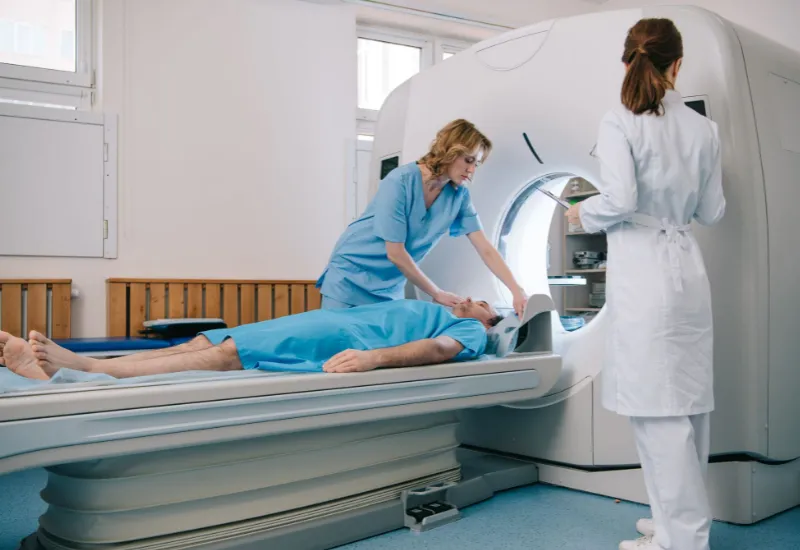Magnetic Resonance Imaging scanning is the most common and highly effective diagnostic methodology medical health professionals use worldwide. Did your doctor prescribe you an abdominal MRI scan, and you're unsure about what the procedure entails? Let us delve into how much an MRI of the abdomen costs, what is done during the process, and what an abdominal MRI scan shows.
What is an Abdominal MRI scan?
Magnetic Resonance Imaging of the abdomen is a painless and non-invasive procedure that pictures the inside of the abdomen through radio waves and strong magnets. An MRI scan does not include exposure to ionizing radiation or X-rays.
What does an abdominal MRI show?
An abdominal MRI forms high resolution and multi-dimensional images of a number of organs present inside the abdominal cavity. This includes the stomach, liver, pancreas, gallbladder, large and small intestines, and spleen. It can also clearly depict lymph nodes and blood vessels and detect hints of abnormal growths.
What is an abdomen MRI scan used for?
MRI scans of the abdomen are used for a variety of purposes and are typically prescribed when a medical professional suspect's something wrong in your abdominal area. Such complications can usually not be looked into via physical examinations, and thus abdominal MRI scans come in handy. They allow crystal clear insight into blood vessels, blood flow, lymph nodes, and causes of swelling of pain in the abdomen.
A sensitive and aptly carried out abdominal or pelvic MRI scan can detect or diagnose the following ailments.
-
Renal vein thrombosis
-
Hydronephrosis or swelling of the kidney from urine reflux
-
Glomerulonephritis or inflammation of the kidney glomeruli
-
Obstruction of the vena cava
-
Obstruction of the renal arteries
-
Pancreatic cancer
-
Staging of bladder, uterine, or prostate cancer
-
Detection of lesions and distinguishing them from cancer
-
Kidney transplant rejection
-
Tissue damage in organs and its extent
-
Tumors or abnormal masses in the gallbladder
-
Tumors or masses in neighboring organs
-
Abnormalities in the lymph nodes or lymphadenopathy
-
Hemangiomas, abscesses, and other focal diseases
-
Acute tubular necrosis
-
Enlarged or swollen liver or spleen
-
Swollen or bloated gallbladder or bile duct
-
Bile stones and bile duct stones
How is an abdominal MRI scan done?
Medical professionals typically advise avoiding food and drink for at least 4 hours prior to the procedure as substances within the stomach can interfere with the scanning and image formation. You can continue taking medications as per your regular schedule unless advised otherwise by your doctor.
Upon your arrival in the radiology unit, you will be required to change into scrubs and remove any metallic objects or accessories that you may have on your body. These include hairpins, watches, jewelry, piercings, underwear with metallic components, eyeglasses, foil-lined medication patches, dentures, etc.
You may also be provided with headphones for protection against the loud noises produced by the MRI machine. Pro tip: you can listen to music through those headphones as well.
An abdominal MRI with contrast includes injecting a contrast agent called gadolinium intravenously by starting an IV in your arm. Unlike the contrast agents used in X ray, this contrast agent does not contain iodine and thus rarely causes allergic reactions or other such complications. An abdominal MRI scan without contrast does not include this step.
Individuals to be scanned are then urged to lay down on a padded scanning table that glides into a sizable tubular machine known as the MRI machine. This machine is well lit on the inside and has a fan to blow fresh air on you gently.
You can speak with the technologist through a two-way intercom, and they will also be able to see you. However, since most scans are highly sensitive to movement, you will be asked not to move your body, eyeballs, or lips, and even hold your breath for 15-20 seconds to remain perfectly still. It is usual for the machine to make recurrent thumping and knocking sounds as it goes about its scan.
How much does an abdominal MRI with and without contrast cost?
The direct pay price of an abdominal MRI with contrast comes up to about $846, with the estimated average total being $1,692. In contrast, an abdominal MRI without contrast costs about $664 in direct pay, $863 on average, and about $1,328 in total. An abdominal MRI both with and without contrast costs comparatively more, with the direct pay price coming up to $1,033 and the estimated total to about $2,065.
Abdominal MRI is an expensive procedure, but you can get it done by certified medical experts for astonishingly low prices at Cura4U. For instance, Florida residents can get it done from any Quest Diagnostics center for as low as $500! Get to know more about how Cura4u works.











